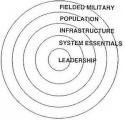... Our research indicates that the best time to divide a country along ethnic or religious lines is before tensions escalate to civil war or large-scale violence. Since 1900, mini-states that emerge from peaceful breakups of countries have a 95 percent success rate in avoiding militarized confrontations with each other.
The bad news is that the optimal time to partition Iraq has passed. The months soon after Saddam Hussein's removal from power in 2003 -- that is, before Iraqi politics came to be dominated by extremist leaders advocating sectarian violence -- provided a window of opportunity for dividing the Iraqi state...
The partition scenario that now faces Iraq is not as desirable as it once was, but neither is it hopeless. A partition designed to stop a civil war runs the risk of transforming the conflict into an international battleground between the mini-states (e.g., the 1998 war between Ethiopia and Eritrea).
One might similarly worry about Sunni and Shiite states clashing in the future. Based on past cases of partition carried out after civil war, this is a 50-50 proposition. There is also the risk that the new states will fall prey to future civil wars, but this occurs only a third of the time. Thus, there is reason to hope that a divided Iraq could avoid future problems, but several risks loom on the horizon.
Given that the Kurdish northern part of Iraq is generally stable and that there is relatively little violence between the Kurds and other major groups, the separation of the Kurds from Iraq could reinforce peace in the north. Yet, this could also activate a potentially dangerous territorial dispute with Turkey, which has a large and rebellious Kurdish population within its own southeastern borders. Any attempts to expand a nascent Kurdish state could ignite a war with Turkey (and perhaps with Iran and Syria as each has significant Kurdish populations). Securing Turkish cooperation for any plan is essential.
The more problematic scenario is presented by the potential Sunni-Shiite separation. The present sectarian violence suggests that the Shiite and Sunni states would not only be predisposed to fight each other after the separation, but also to experience future civil wars within their own mini-states...












Bookmarks